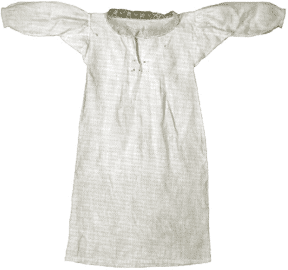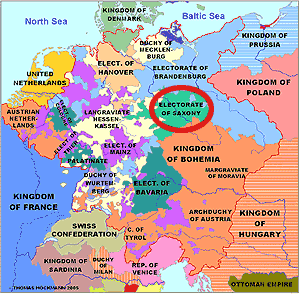Notes for Pages 30-39.
< 10-29 | Notes Index | 40-58 >
Page 30: Tutoring for the children of aristocrats and upper bourgeois – often your (potential) patron – was generally considered to be hell on earth. You lived in a bizarre class limbo, treated as something of a lowly house servant, yet expected to teach the children everything about being upper class, from etiquette to fencing to French grammar.
One major slip-up and your prospects were toast…do a good job, and you could be a made man. In the meantime, the money was poor, the emotional stress astronomic, and the work totally dispiriting. It induced suicidal urges in more than a few cash-strapped scholars of the day.
You can still see this awful system in place in the Stendhal novel The Red and the Black.
Page 31: Dad’s outfit is sooooo 1750. Johann, meanwhile, is wearing a lovely contemporary silk overcoat. Somebody in the family has to have style.
As for dad, like most craftsmen of the time, Avner works in the same house as he lives – this meant that most days were spent wearing the period equivalent of a bathrobe and bunny slippers.
Most people owned only a very few outfit elements suited for outerwear – generally made of  wool or printed cotton in a practical palette – which would last them for ages and be washed very infrequently.
wool or printed cotton in a practical palette – which would last them for ages and be washed very infrequently.
In contrast, you could own dozens of basic chemises or under-gowns, which would be cycled through until utterly unwearable, then hauled out two or three times a year and subjected to the enormous, never-ending group torture session known as The Great Wash.
Mention wash day to Liesl, and she will probably start crying outright.
Page 32: There are reasons both personal and cultural why he ran off with a Christian girl.
Culturally, the Jewish community in general was in a state of upheaval around this time, with a lot of reformers trying to integrate more into the local culture and join the longstanding Jewish intellectual tradition to the larger goals of the Enlightenment. So there was plenty of room for confusion, conflict, and unhappiness, above and beyond the usual flak. Avner’s family didn’t cotton to it all, and with no local progressives to latch onto, marrying goy was an alternative.
As for why Veronika would marry him…
Page 33:I was going to have a whole scene with the girl who helps out in the house that was basically an excuse for me to talk about household candle-making, which involved giant pots of fat and very little fun.
I commissioned Anne to find me a dog, with the stipulation it be a mutt. She found this nice critter, who is probably a mix of breeds that have no excuse to exist in 18th century Germany. I don’t care, he’s cute.
They got Hugo to chase the rats that generally infest chicken-yards, but he’s much better at bothering the chickens.
Page 34: There was rain recently, or else Luther wouldn’t even think about walking in the alley groove. Bad things went there.
Luther’s town is a dense old medieval village on a mid-sized east/west trade route. It’s encircled by a couple of disintegrating patchwork stone walls, so carriages and such can’t get in or out at night, but on foot you can do it without much trouble.
Page 34-5:This is a pretty remarkable place for a town of this caliber, and is one of the few things the outer world knows the town for. The shop functions as a bookstore as well as a for-charge lending library – Frau Vogel lets Luther rent the obscure books he orders, with the lending fee going towards an eventual purchase. Very eventual.
The Vogels have been running this place for ages – maybe there was a seminary in town back in the day. Herr Vogel passed away a few years ago, and Frau Vogel is a childless widow who nonetheless keeps it running.
There are a lots of religious texts in here, obviously. You have to ask for the trashy stuff under the counter. Ever seen 18th century porn? Yeah, it’s weird.
 Page 35:Yes, Bite Me! readers, that’s Lucien. The visual translation between drawing styles was fun to figure out. As for the other aspects of his Lucien-ness, well, it’s up to you to piece together.
Page 35:Yes, Bite Me! readers, that’s Lucien. The visual translation between drawing styles was fun to figure out. As for the other aspects of his Lucien-ness, well, it’s up to you to piece together.
Page 36: Luther was basically up for his PhD back at Gottingen. By that point you were occasionally delivering lectures of your own material.
Lucien’s career isn’t that odd – there was money to be had in tutoring undergraduates for specific courses and subjects, both through colleges and privately. Couple that with some teaching at the local schoolhouses, taking official lecture notes, and other intellectual piece-work, and you could squeak by.
Very tangentially, St.Yves is in Bretagne, the Northwestern sticky-out bit of France, and the part with the closest cultural connection to Britain, which maybe explains a lot about Lucien. Saint Yves is the patron saint of lawyers.
Page 37: Saint Augustine of “Confessions” (best known for saying “Oh Lord, give me chastity…but not yet”). A 4th century cornerstone of Western Christianity, adored by Catholics  and Protestants alike, and still a good read.
and Protestants alike, and still a good read.
See, Luther is capable of being something other than cranky! Still sarcastic, though.
Page 38:Luther’s mom has reason to narrow her eyes at French things. If a thing could be made, acquired, style, or iterated in a French way, from France, it was trendy, and probably morally dissipated.
Familienwald roughly means “Forest of the Family”, which is an unusual town name, but not outright weird.
The Quartier Latin (Latin Quarter) is the old University district in Paris, adjacent to the South side of Seine. Full of roving students and intellectuals, and as a result chock-a-block with booksellers. If you go there today, the walkways along the river are lined with blue book carts selling everything from reproduction movie posters to rare first editions of novels.
Page 39: Family genealogies were a big thing, and you could make some cash off of compiling them for rich folk. Not particularly enthralling work, though, and you had to have nice handwriting.
As for the “local prince”: The Holy Roman Empire (jokingly referred to as “Neither Holy, nor Roman, nor an Empire” by clever history teachers the world over) could count over a half dozen individual Germanic states as members, not to mention several non-members that it regularly went to war with.
Most people lived within the domain of a local noble or a penny-ante royal, essentially a  governor with a pedigree, who ran his or her tidy chunk of territory with some nominal obedience to the next rank up on the chain. This prince or duke or what-have-you would often oversee the funding of the local university, coordinate with the high-end clergy, and generally try to keep the metaphorical trains running on time.
governor with a pedigree, who ran his or her tidy chunk of territory with some nominal obedience to the next rank up on the chain. This prince or duke or what-have-you would often oversee the funding of the local university, coordinate with the high-end clergy, and generally try to keep the metaphorical trains running on time.
As for the details of this particular location, I’ve intentionally kept Luther’s home town vague. The fact that he went to Göttingen suggests Saxony.
“refused a lecture post” – this part of academia hasn’t changed, really. Finding and keeping a decently-paid professorial position involved equal amounts of backstabbing and sucking up. And in an era devoid of speedy communication, figuring out who might hire you in another town and getting there in time was tricky.